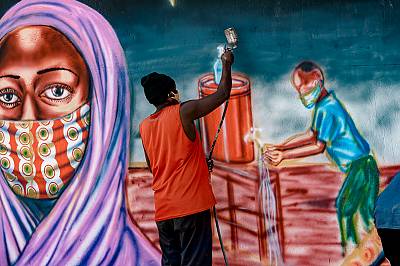Living Heritage and the COVID-19 pandemic: responding, recovering and building back for a better future
 |
| COVID-19 awareness mural in the making in Mwananyamala (Tanzania), painted in collaboration with local artists. © Rasheedhrasheed |
Living heritage during the Pandemic
The impact of the pandemic has been far-reaching and devastating. It has also highlighted the importance of our interconnectedness and common humanity. For many communities struggling with or recovering from the pandemic, living heritage has become an important source of resilience, helping to overcome social and psychological challenges and strengthen ties. In the past year, communities have adapted how they practice their living heritage to unexpected situations, highlighting the resilience of living heritage and our reliance on it.
There can, of course be no living heritage without the people who practice and transmit it. At the same time, the restrictions put in place to counter the spread of the COVID 19 virus have reminded us that we cannot thrive without the practices that we inherited from our ancestors and which define us. The pandemic has highlighted the value of intangible cultural heritage and the importance communities attach to its continued practice and expression.
In April 2020 the Living Heritage Entity launched an online survey aimed at grasping the impact of the COVID-19 pandemic around the world. Thanks to the active participation of numerous cultural actors, UNESCO received more than 200 testimonies from 78 countries. The “Living Heritage in the face of the COVID-19 pandemic” report, now available online, summarizes the results of the survey and the challenges and opportunities for living heritage during this crisis. It looks at three key questions and provide answers to the following:
1. How is the pandemic impacting living heritage?
2. How is living heritage adapting to the crisis?
3. How are communities mobilizing their living heritage to help them face the pandemic?
Recommendations for post recovery plans
Although many countries are still in the midst of the pandemic, debates are already sparking worldwide on what the future will look like and what we can do to build back better for future generations. To contribute to these discussions, survey participants were asked to share their opinion on what could be done from the lens of living heritage to recover from the COVID-19 pandemic. Their inputs were summarized in three key recommendations detailed in the report, providing essential insight about how to integrate living heritage into post-pandemic recovery plans.
1. Recommendation 1: Help communities build back better by strengthening recovery support mechanisms to living heritage bearers at the local level, including through local governance structures.
2. Recommendation 2: Take advantage of digital technologies to increase the visibility and understanding of living heritage.
3. Recommendation 3: Strengthen and amplify the linkages between safeguarding living heritage and emergency preparedness, response and recovery plans and programmes.
Pilot projects to build back better
UNESCO field offices have launched eight pilot projects in close cooperation with local key actors. These projects are based on the above-mentioned recommendations and target concrete safeguarding measures, which will be progressively implemented to help people recover from the longer-term negative effects of the pandemic. They include:
· Barbados: Living heritage virtual link up
· Bosnia and Herzegovina: Digitization of the intangible cultural heritage elements of communities
· Bolivia, Colombia, Ecuador and Venezuela: Transmedia intangible cultural heritage for sustainable development
· Gambia: Strengthening the contribution of living heritage in the context of the COVID-19 pandemic and its integration into national initiatives for disaster risk reduction
· Indonesia: Recovery of living heritage from the COVID-19 pandemic: Ulos weavers and Gorga sculptors in the Toba region
· Jamaica: Supporting local income-generating activities with the Charles Town Maroons
· Saint Vincent and the Grenadines: Living heritage and crisis situations in Saint Vincent and the Grenadines
· Sint Maarten:Living heritage, youth and COVID-19
International assistance to support recovery initiatives
The Intergovernmental Committee for the Safeguarding of the Intangible Cultural Heritage grants assistance from the Intangible Cultural Heritage Fund to safeguard intangible cultural heritage as defined in the Convention (Article 20).
State Parties are encouraged to apply for funding to the international assistance mechanism of the 2003 Convention for projects and programmes aimed at safeguarding intangible cultural heritage to build resilience and strengthen practices.

Address: 81, Laiguangying West Road, Chaoyang District, Beijing, China
Zip Code: 100021
Tel: 86-10-64966526
Fax: 86-10-64969281
E-mail: crihap@crihap.cn
Leave us your e-mail address, we'll let you know about current events.



